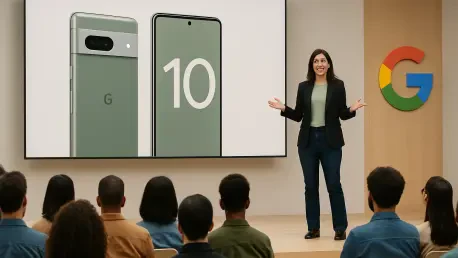In an era where tech launches are as much about spectacle as they are about substance, Google’s recent unveiling of the Pixel 10 smartphone has sparked intense debate among industry watchers and enthusiasts alike. Rather than focusing on groundbreaking innovations or detailed technical insights, the event leaned heavily on celebrity appearances and entertainment, leaving many to question whether the company truly connected with its core audience. Hosted by a well-known late-night personality alongside a parade of familiar faces, the presentation aimed to generate buzz but instead drew criticism for prioritizing flash over depth. This approach has ignited discussions about the balance tech companies must strike between marketing hype and delivering meaningful content that resonates with tech-savvy consumers hungry for innovation.
Unpacking the Event’s Format and Reception
A Celebrity-Driven Spectacle Over Substance
The Pixel 10 launch event took a bold swing at capturing attention by enlisting a popular late-night host to steer the show, accompanied by various celebrity cameos intended to amplify the device’s appeal. However, this strategy quickly unraveled as the focus shifted away from the smartphone’s features to rehearsed banter and over-the-top enthusiasm that felt disconnected from the product itself. Chants emphasizing long-standing features like water resistance, which have been part of the Pixel lineup for years, came across as outdated and irrelevant to an audience expecting cutting-edge revelations. Instead of diving into what sets the Pixel 10 apart, the event seemed more akin to a variety show, leaving tech enthusiasts frustrated by the lack of depth. This overreliance on entertainment raised eyebrows, as it starkly contrasted with the more focused, product-centric unveilings often seen from competitors in the smartphone market.
Audience Disconnect and Misplaced Priorities
Criticism of the event also centers on how it failed to engage its primary audience—tech-savvy consumers and industry professionals who prioritize innovation over spectacle. The host’s attempts to simplify complex concepts like artificial intelligence often felt patronizing, with explanations that underestimated the audience’s knowledge base. Interactions meant to humanize the technology through celebrity endorsements instead appeared forced and out of touch, diminishing the credibility of the presentation. While the intent may have been to make the Pixel 10 accessible to a broader demographic, the execution alienated those most likely to champion the device. This disconnect suggests a fundamental misstep in understanding what drives interest in tech launches, highlighting a need for Google to reassess how it communicates value to its core users rather than chasing fleeting viral moments.
Analyzing Missed Opportunities and Future Implications
Overlooked Innovations in the Pixel 10
Amid the glitz of the launch event, the Pixel 10’s genuinely impressive features were largely sidelined, much to the disappointment of those eager for technical details. The smartphone boasts advanced AI-driven capabilities in areas like photography, communication, and real-time translation, alongside the integration of Google’s AI assistant, Gemini, into augmented reality glasses. These developments represent significant steps forward, yet they were barely explored during the presentation. Instead of meaningful discussions or demonstrations, the spotlight remained on superficial elements, such as awkward commentary about the phone’s design aesthetics. This missed opportunity to showcase how these innovations could impact users’ daily lives left the audience with more questions than answers, undermining the potential excitement surrounding the device’s release.
Lessons for Tech Marketing Strategies
Reflecting on the broader implications of this launch, it becomes evident that tech companies must tread carefully when blending entertainment with product reveals. While a few authentic moments—such as segments with creators who demonstrated practical uses of the Pixel 10—offered glimmers of hope, they were insufficient to offset the overall perception of shallowness. The consensus among experts is that future events should prioritize substance, providing in-depth explorations of technology and its real-world applications over celebrity-driven hype. As competition in the smartphone market intensifies, Google could benefit from adopting a more balanced approach that respects the intelligence of its audience. The Pixel 10 event serves as a reminder that genuine engagement, rooted in transparency and innovation, remains the most effective way to build trust and excitement among consumers in an increasingly discerning tech landscape.
Charting a Path Forward for Google
Looking back, the Pixel 10 launch event stumbled in its attempt to merge entertainment with technology, revealing a critical need for recalibration in how such unveilings are crafted. The heavy reliance on gimmicks over detailed content not only disappointed viewers but also overshadowed the device’s promising advancements. Moving forward, a shift toward technology-centered presentations that highlight practical benefits and user impact could help restore confidence among enthusiasts. Emphasizing authentic storytelling and expert insights, rather than leaning on celebrity spectacle, might better align with audience expectations. As Google navigates its place in a crowded market, the lessons from this event underscore the importance of focusing on innovation as the true driver of interest, ensuring future launches deliver the depth and relevance that tech fans crave.









